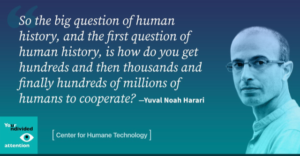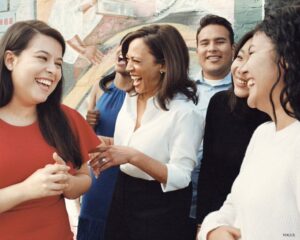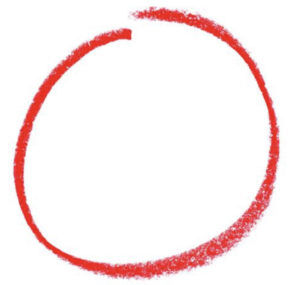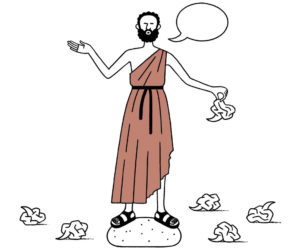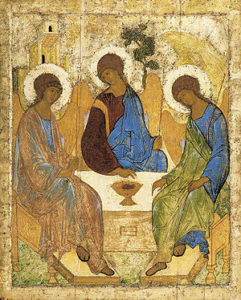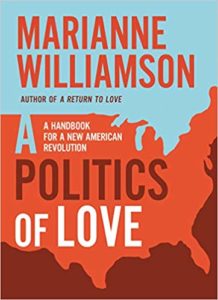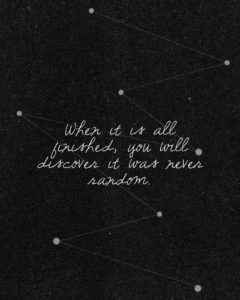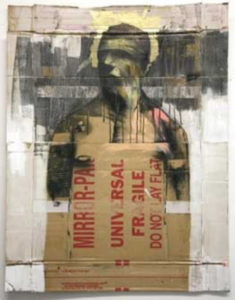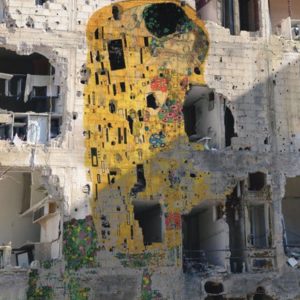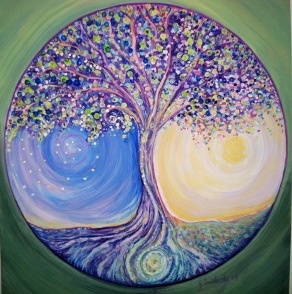unity
Unity?
January 19, 2021Documentary film maker Ken Burns:
“I used to think there were three great crises: the Civil War, the Depression and the Second World War in American life. I would add this. And maybe this is the very, very worst. But at the same time, we just keep going forward. There is no other option but to endure.” [NPR]
‘Well, darkness has a hunger that’s insatiable, and lightness has a call that’s hard to hear.’
-Indigo Girls
American politics has reached a moment of existential uncertainty. Beyond the headlines and news alerts are problems bigger than any one administration—problems that stem from the deep tensions and challenges in America’s political institutions.
It’s time to reevaluate and revisit how we think about American democracy. The Founding Fathers did their best, but the hosts of a new podcast, “Politics in Question,” have some ideas, too. They discuss political reforms in this first-of-its-kind show that asks the very biggest questions.
Join hosts Lee Drutman, Julia Azari, and James Wallner, three lively experts on American political institutions and reform, as they imagine and argue over what American politics could look like if citizens questioned everything.
There are a lot of podcasts about the daily chaos. But “Politics in Question” is the first to step back and think big about the basic structures and processes of democracy — and to take nothing for granted.
This podcast is part of The Democracy Group, a network of podcasts that examines what’s broken in our democracy and how we can work together to fix it.
“From all the thoughts of ‘I’ and ‘man,’ that man finds utter peace.”
Bhagavad Gita
Dear Dayle,
The extremist behavior and violence that took place in Washington, D.C. on January 6 was truly shocking and worthy of condemnation—many have already done so. The whole world is transfixed, bearing witness to the awful and extraordinary unfolding of history.
In my previous letters I wrote about the DISORDER that is already upon us, as well as the consequences that ensue when illusions of power and privilege co-opt and distort Christianity. At the Center for Action and Contemplation, we are free to speak in great part because we are not beholden to the usual constituencies. Using the brilliant metaphor from the Hebrew Scriptures, we are “outside the camp” of either political party, any need to influence an election, and, by the grace of God, any negative or fear-based church pressure from Rome, Santa Fe, or Assisi.
We are also, like few other organizations, free from the coercion of donors and finance, thanks to almost thirty-three years of operating with our priorities clearly in view to all who cared to study or read our publications. Blessedly, our donors have not run for cover over time, but only increased in numbers, continuing to join us—even from outside the usual camps of both religion and politics.
Few people enjoy such freedom of living and teaching from the edge of the inside. This is the unique position that a prophetic charism holds and for which it is responsible; it is structurally quite rare, and therefore we must use it.
“Moses used to take the tent, and pitch it outside the camp, at some distance from the camp. . . . Anyone who wanted to consult Yahweh would go to this tent of meeting outside the camp.” (Exodus 33:7)
The “tent of meeting” is the initial image and metaphor that eventually became our much later notion of “church.” Moses had the prescience and courage to move the place of hearing God outside and at a distance from the court of common religious and civic opinion—this was the original genius that inspired the entire Jewish prophetic tradition. It is quite different than the mere liberal and conservative positions, and often even at odds with them. Most of liberalism is based on a secular foundation of knowledge, and most of conservatism is identified with boundary-keeping, order, and control. By contrast, Prophecy and Gospel are rooted in a contemplative and non-dual way of knowing—a way of being in the world that is utterly free and grounded in the compassion of God.
The early desert fathers and mothers imitated both Moses and Jesus by fleeing to Egypt, Syria, Palestine, and Cappadocia—and some as far as Ireland and Scotland. Beginning in the 4th century, we Christians surrendered our unique and free perspective to the Roman and Byzantine Empires. In the desert and outside the camp, these people discovered what we now call “contemplation”: the alternative mind and the alternative community to the status quo—then and now—of money, power, and war.
The free and graced position found in the tent of meeting is what allowed Jesus and all prophets in his lineage to speak from a minority position. It is always less desirable, compared to the comfortable and enjoyable places at the center and the top; yet it is the Jesus stance, and the place where all Franciscans follow after him.
“Let us go to him, therefore, outside the camp, and be willing to share in his degradation.” (Hebrews 13:13)
For many people, religion as a “cosmic egg” capable of holding universal Truth, collective and personal meaning, is broken. Now, the cracks in this very “uncosmic egg” are rapidly spreading in all directions. Delusions enthrall us and inherent deceit becomes overwhelmingly apparent and manifest in the nihilism of our postmodern age, the denial of science and reasonableness, and the denial of the pandemic that now assaults us all. The very future of the meanings of words and truth are at stake, as specifically exemplified by Trumpism in its many forms.
We must again move with Jesus outside the camp and even be willing to “share in his degradation” if that be God’s will. We must trust that the one who has called us into this present moment will also sustain us and lead us through it.
“Yahweh would speak with Moses face to face [outside the camp] as a young man speaks with his friend. And then Moses would return to the camp.” (Exodus 33:11)
This is the primary vocation of the Center for Action and Contemplation. We invite you to join us—first, in the tent of meeting outside the camp for prayer, dialogue, and deep discernment. Then, like Moses, we must all choose to “return to the camp,” where all of our brothers and sisters live and die.

Maybe unity is not possible, yet, we can remember that we are one, one in humanity as species and co-creators in our reality with ourselves and in each other…especially in context and proximity of losing our democracy, our republic, just three weeks ago. Can we pledge, at least, to cooperation? To listening? To empathy?
We are ‘we the people.’ Let us remember. And may we vow today to divest ourselves from the for-profit platforms and groups that feed disinformation and hate into our collective bloodstream. It must end.
And in less than 24 hours, the first woman vice president in the United States.
-dayle
🤍
‘You’re not crazy, you’re creative.’ ✧
November 3, 2019
A Circle expands forever
It covers all who wish to hold hands
And its size depends on each other
It is a vision of solidarity
It turns outwards to interact with the outside
And inward for self critique
A circle expands forever
It is a vision of accountability
It grows as the other is moved to grow
A circle must have a centre
But a single dot does not make a Circle
One tree does not make a forest
A circle, a vision of cooperation, mutuality and care
—Mercy Amba Oduyoye
Mercy Amba Oduyoye, “The Story of a Circle” (Circle of Concerned African Women Theologians), The Ecumenical Review, vol. 53, no. 1 (January 2001), 97. Used with permission.
✧
Fr. Richard Rohr, Center for Compassion & Contemplation
- Affirming people’s potential is more important than reminding them of their brokenness.
- The work of reconciliation should be valued over making judgments.
- Gracious behavior is more important than right belief.
- Inviting questions is more valuable than supplying answers.
- Encouraging the personal search is more important than group uniformity.
- Meeting actual needs is more important than maintaining institutions.
- Peacemaking is more important than power.
- We should care more about love and less about sex.
- Life in this world is more important than the afterlife (Eternity is Gaia’s work anyway).
✧
Rilke/New Poems:
Mohammed’s Calling
…but the angel, imperious,pointed over and over
to what was written on the page he held,
and would not held and kept insisting: read.
Then the man read, and when he did the angel bowed.
It was as if he had always been reading,
and now was able to obey and bring to pass.
✧
Alexander Stoddard/Grace Notes:
’Any profound view of the world is mysticism.’ -Albert Schweitzer
Love the questions. The bigger the questions, the better. The mysteries of life have never been understood by any human so far and never will be. The little things that make you happy, the order you put into your corner of the universe, the joy you feel from these small rituals, are mysterious. You’re not crazy; you’re creative. It’s all right if you are teased. Who cares? You do these things for yourself.
✧
A BIBLICAL ROUGH DRAFT
The New Yorker
‘Many do not know that the Bible was once a “living document,” passed orally from person to person, and from generation to generation, before finally being written down. Even the most well-known Biblical passages went through countless iterations before arriving at the final, perfect, logical, cohesive, and treasured versions we now hold dear.
Early written drafts of the Bible were the transcribed pontifications of travelling “storytellers,” who tromped from village to village in floppy sandals, swatting at flies, sipping beads of dew from the undersides of donkeys, and fighting dogs for scraps of raw meat. A close reading of the earliest known transcription of a popular excerpt from the Book of Matthew reveals that the “narrator” is suffering from low blood sugar. No doubt a syphilitic holy man dressed in desert rags, he searches in vain for just the right metaphor, a well-aimed zinger with which to make his point. The toil that the poor fellow suffers in so doing undercuts the very principle he is straining to illustrate.’
[Full essay]
https://www.newyorker.com/magazine/2019/11/04/a-biblical-rough-draft
Center for Action & Contemplation: disconnection and love
May 7, 2019‘I’m convinced that beneath the ugly manifestations of our present evils—political corruption, ecological devastation, warring against one another, hating each other based on race, gender, sexual orientation, religion, or nationality—the greatest dis-ease facing humanity right now is our profound and painful sense of disconnection. We feel disconnected from God, certainly, but also from ourselves (especially our bodies), from each other, and from our world. Our sense of this fourfold isolation is plunging our species into increasingly destructive behavior and much mental illness.
Yet many are discovering that the Infinite Flow of the Trinity—and our practical, felt experience of this gift—offers the utterly grounded reconnectionwith God, with self, with others, and with our world that all spirituality, and arguably, even politics, is aiming for, but which conventional religion and politics fail to access.
Trinity overcomes the foundational philosophical problem of “the One and the Many.” Serious seekers invariably wonder how things can be both deeply connected and yet clearly distinct. In the paradigm of Trinity, we have three autonomous “Persons,” as we call them, who are nevertheless in perfect communion, given and surrendered to each other with an Infinite Love. With the endless diversity in creation, it is clear that God is not at all committed to uniformity but instead desires unity—which is the great work of the Spirit—or diversity overcome by love.
Uniformity is mere conformity and obedience to law and custom; whereas spiritual unity is that very diversity embraced and protected by an infinitely generous love.
This is the problem that our politics and most superficial religion are still unable to resolve.
Trinity is all about relationship and connection. We know the Trinity through experiencing the flow itself, which dissolves our sense of disconnection. The principle of one is lonely; the principle of two is oppositional and moves us toward preference and exclusion; the principle of three is inherently moving, dynamic, and generative. Trinity was made to order to undercut all dualistic thinking. Yet Christianity shelved it for all practical purposes because our dualistic theologies could not process it.
God is not a being among other beings, but rather the Ground of Being itselfwhich then flows through all beings. As Paul says to the intellectuals in Athens, this God “is not far from us, but is the one in whom we live and move and have our being” (Acts 17:27-28). The God whom Jesus reveals is presented as unhindered dialogue, a positive and inclusive flow, and a waterwheel of outpouring love that never stops! St. Bonaventure called God a “fountain fullness” of love.
Our sense of disconnection is only an illusion. Nothing can stop the flow of divine love; we cannot undo the eternal pattern even by our worst sin. God is always winning, and God’s love will finally win in the end. Nothing humans can do can stop the relentless outpouring force that is the divine dance. Love does not lose, nor does God lose. That’s what it means to be God!’
Image credit: (detail), Andrei Rublev, c. 1400-1410, Tretyakov Gallery, Moscow, Russia.
Trinity: The Trinity depicts the three angels who visited Abraham at the Oak of Mamre (Genesis 18: 1-8); the painting is full of symbolism and is interpreted as an icon of the Holy Trinity. At the time of Rublev, the Holy Trinity was the embodiment of spiritual unity, peace, harmony, mutual love and humility.
Marianne Williamson, Democratic Presidential Candidate who bases her platform on love and connection, needs only 2,400 singular donations [$1-$5], 65,000 total, to be allowed to join the first debates schedule for June in Miami. Please donate at https://www.marianne2020.com
“A nation’s behavior is just like an individual’s – either an expression of our higher nature or our lower nature. In the case of both, cause and effect holds: whatever we do has consequences. Love leads to harmony & lovelessness to chaos.That’s why wisdom is relevant to politics.”
Without method.
March 19, 2019A community paradigm.
May 9, 2018There is simplicity…ease…in kindness, inclusivity, and compassion. Complexity and chaos are created when we allow ‘other’, dominance, greed, and power.
Grace is born in community, communication, and care.
A new paradigm, therefore, is created locally, which in turn effects the collective.
Not government, or policy, or military.
We, the people, can embrace our own dialogue, and meaning, without outside influences born of profit, and alternative motive.
’It’s not that there are no difference—the world is made of infinite variety—rather it is the seizing of differences, the fearing of differences, that keeps us from feeling grace.
Paradoxically, everything in life touches the same center through its uniqueness, the way no two souls are the same, though every soul breathes the same air.
The mind’s worst diseas: the endless deciding between want and don’t want, the endless war between for and against.’ -Mark Nepo
‘Living in community means living in such a way that others can access me and influence my life and that I can get “out of myself” and serve the lives of others. Community is a world where brotherliness and sisterliness are possible. By community, I don’t mean primarily a special kind of structure, but a network of relationships. On the whole, we live in a society that’s built not on community and cooperation but on individuality, greed, and competition—often resulting in oppressive economic systems, unnecessary suffering, and environmental devastation.
Today we might call powers and principalities our collective cultural moods, mass consciousness, or any institutions considered “too big to fail.” These are our idols. We are mostly oblivious to this because we take all our institutions as normal civilization and absolutely inevitable. It is the “absolutely” that makes us blind and allows us to make passing structures into complete idols. Because we partly profit from these frequently collective evils, it doesn’t look like evil at all—but something good and necessary. For instance, I’ve never once heard a sermon against the tenth commandment, “You shall not covet your neighbor’s goods,” because in our culture that’s the only game in town. It is called capitalism, and we live comfortably because of it. It is only our unwillingness to question such powers and principalities, or in any way limit them (which is worship), which makes them into a false god. “The angels of darkness must always disguise themselves as angles of light.
(see 2 Corinthians 11:(14-15)
The individual is largely helpless and harmless standing against the system of disguise and illusion. Thankfully, we’re seeing many people, religious and secular, from all around the world, coming together to form alternative communities for sharing resources, living simply, and imagining a sustainable and nonviolent future. It is hard to imagine there will be a future without them.’
-Richard Rohr
Rose’s canon.
September 11, 2017‘In our age, tragedies are collective & shared across the world, & even in the darkest moments of destruction, unity & love always emerge.’
Let’s bring back:
✿ Emotions
✿ Creativity
✿ Intuition
✿ Justice
✿ Peace
✿ Nature
✿ Love
-Jennifer Rose
@SeeTheRoses
This land is our land. ✿
March 7, 2017We are members one of another.
-Ephesians 4:25
Right thought, constantly poured into consciousness, will eventually purify it.
-Science of Mind
Think now of an open field.
This open physical space is a metaphor for how we are affected by others through a unity of relationship (Ernest Holmes). ✿ Consider someone has divided virgin land into one-acre plots, and given an acre apiece to a number of individuals who are free to raise whatever they want.
“After years of cultivating our individual gardens, what will we fine” (Holmes)?
We will find much in our garden that we did not plant. Seeds from nearby plots of land have blown onto our plot, or birds have brought seeds. ✿ Those seeds have produced plants we do not want, yet we were not able to prevent their growth.
No matter how well we have tended our own garden, it is affected by other lands nearby. ✿ All pieces of land are affected by the others. Similarly, our individual consciousness is not separate from the Universal. There is only one Mind and each of us is part of this unity.
The consciousness of each person influences the collective field. ✿ Other people experience that which we cultivate in our consciousness, and we are affected by the consciousness of others.
We contribute to the overall well-being of the world when we cultivate a beautiful garden in our mind. ✿ We can do so by eliminating unloving thoughts and by planting instead only those ideas that generate condition we ourselves desire to experience.
[Science of Mind. March 2017. p. 42]
“I cultivate a beautiful consciousness.”
First moment of dawn…
November 16, 2016Mark Nepo
A very touching story from the Talmud captures this soft paradox of how we all journey alone together.
A rabbi asks his students, “How do you know the first moment of dawn has arrived?” After a great silence, one pipes up, “When you can tell the difference between a sheep and a dog.” The Rabbit shakes his head no. Another offers, “When you can tell the difference between a fig tree and an olive tree.” Again The Rabbi shakes his head no. There are no other answers.
The Rabbi circles their silence and walks between them, “You know the first moment of dawn has arrived when you look into the eyes of another human being and see yourself.
[Simply breathe your heart open, and try to feel both your aloneness and what you share with every other human being.]
